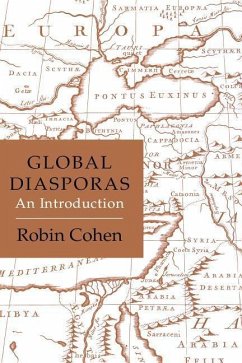During the early modern period, trade and labour diasporas girded the mercantilist and early capitalist worlds. Today the term has changed again, often implying a positive and ongoing relationship between migrants' homelands and their places of work and settlement. In his perceptive and arresting analysis, Robin Cohen illuminates all the changing meanings of diaspora and the contemporary diasporic condition.
Hinweis: Dieser Artikel kann nur an eine deutsche Lieferadresse ausgeliefert werden.
Hinweis: Dieser Artikel kann nur an eine deutsche Lieferadresse ausgeliefert werden.
Praise for Previous Editions
Cohen's erudition is vast ... his interpretations are solid and well informed. By and large one can only marvel at the scope of Cohen's learning and the richness of his vocabulary.
Mark J. Miller, University of Delaware, USA, Journal of World History
Cohen's book offers a timely overview of diasporas. The book is also engagingly written, with Cohen's personal anecdotes adding zing rather than self-indulgence to the analysis.
Robert C. Smith, Columbia University, USA, Political Studies Quarterly
A succinct but satisfying book ... as Cohen convincingly demonstrates here, the diaspora wave is well and truly upon us.
Sarah Ansari, Royal Holloway, University of London, UK, Times Higher Educational Supplement
Robin Cohen's delineation of common features associated with diaspora, and his proposition of 'ideal types', are important conceptual tools for use in systematic theorizing and research about diaspora, no matter the geographic location.
Jualynne E. Dodson, Michigan State University, USA, Athens Journal of Social Sciences
Cohen's erudition is vast ... his interpretations are solid and well informed. By and large one can only marvel at the scope of Cohen's learning and the richness of his vocabulary.
Mark J. Miller, University of Delaware, USA, Journal of World History
Cohen's book offers a timely overview of diasporas. The book is also engagingly written, with Cohen's personal anecdotes adding zing rather than self-indulgence to the analysis.
Robert C. Smith, Columbia University, USA, Political Studies Quarterly
A succinct but satisfying book ... as Cohen convincingly demonstrates here, the diaspora wave is well and truly upon us.
Sarah Ansari, Royal Holloway, University of London, UK, Times Higher Educational Supplement
Robin Cohen's delineation of common features associated with diaspora, and his proposition of 'ideal types', are important conceptual tools for use in systematic theorizing and research about diaspora, no matter the geographic location.
Jualynne E. Dodson, Michigan State University, USA, Athens Journal of Social Sciences








